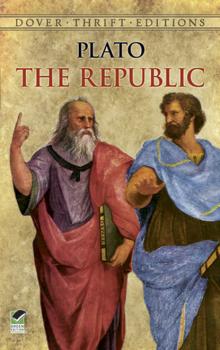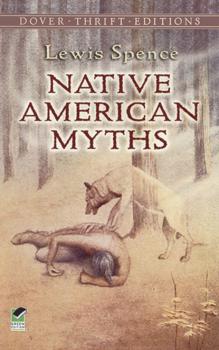Dover Thrift Editions
Скачать книги из серии Dover Thrift EditionsThe Republic
Often ranked as the greatest of Plato's many remarkable writings, this celebrated philosophical work of the fourth century B.C. contemplates the elements of an ideal state, serving as the forerunner for such other classics of political thought as Cicero's De Republica, St. Augustine's City of God, and Thomas More's Utopia.Written in the form of a dialog in which Socrates questions his students and fellow citizens, The Republic concerns itself chiefly with the question, «What is justice?» as well as Plato's theory of ideas and his conception of the philosopher's role in society. To explore the latter, he invents the allegory of the cave to illustrate his notion that ordinary men are like prisoners in a cave, observing only the shadows of things, while philosophers are those who venture outside the cave and see things as they really are, and whose task it is to return to the cave and tell the truth about what they have seen. This dynamic metaphor expresses at once the eternal conflict between the world of the senses (the cave) and the world of ideas (the world outside the cave), and the philosopher's role as mediator between the two.High school and college students, as well as lovers of classical literature and philosophy, will welcome this handsome and inexpensive edition of an immortal work. It appears here in the fine translation by the English classicist Benjamin Jowett.
The Return of Sherlock Holmes
In «The Final Problem,» the tale that preceded this collection, the world's most famous detective had a seemingly fatal encounter with his nemesis, Professor Moriarty. When Sherlock Holmes's devoted fans refused to allow Arthur Conan Doyle to kill their beloved sleuth, the author complied with more stories. This compilation features all thirteen tales, which originally appeared in The Strand Magazine. Holmes returns in «The Adventure of the Empty House,» in which he explains his near-miraculous escape from death and accounts for his lengthy absence to the astonished Dr. Watson. Other mysteries include «The Dancing Men,» involving a series of cryptic threats; «The Six Napoleons,» concerning stolen jewels and images of the French emperor; «The Norwood Builder,» a murderous attempt at revenge; and «The Missing Three Quarter,» in which a rugby player disappears on the eve of a crucial match.
Richard III
The final play in Shakespeare's masterly dramatization of the strife between the Houses of York and Lancaster, Richard III offers a stunning portrait of an archvillain–a man of cunning and ruthless ambition who seduces, betrays and murders his way to the throne. In the process, Richard delivers great speeches and engages in formidable confrontations with a large cast of characters, almost all of them caught up in the terrible struggle for power that dominates the play. It is a tribute to Shakespeare's dramatic genius and knowledge of human psychology that by the end of the drama the detestable Richard begins to elicit some sympathy for the awful plight in which he finds himself. Explanatory footnotes and an introductory note are included.
Pragmatism
A profoundly influential figure in American psychology, William James (1842–1910) was also a philosopher of note, who used Charles S. Peirce's theories of pragmatism as a basis for his own conception of that influential philosophy. For James, this meant an emphasis on «radical empiricism» and the concept that the meaning of any idea — philosophical, political, social, or otherwise — has validity only in terms of its experiential and practical consequences. James propounded his theories of pragmatism in this book, one of the most important in American philosophy. In a sense, he wished to test competing systems of thought in the «marketplace of actual experience» to determine their validity, i.e. whether adopting a particular philosophical theory or way of looking at the world makes an actual difference in individual conduct or in how we perceive and react to the varieties of experience. In these pages, James not only makes a strong case for his own ideas, but mounts a powerful attack against the transcendental and rationalist tradition.For anyone interested in William James or the history of American philosophical thought, Pragmatism is an essential and thought provoking reference. In this handy, inexpensive edition, it will challenge and stimulate any thinking person.
Revelation and Other Prophetic Books of the Bible
Some view it as a prophecy of events already fulfilled, and others as a foretelling of things yet to come. Still others regard it as an expression of eternal spiritual truths, rather than specific incidents. The biblical Book of Revelation supports a variety of interpretations — and controversies — and it exerts an endless fascination on readers of every generation.This compilation features highlights from the King James edition of Revelation, along with other prophetic books of the Bible: Isaiah, which envisions the overthrow of Babylon and the restoration of Israel; Ezekiel, rich in proverbs that inspire hope and declare the certainty of a coming judgment; Daniel, in which the prophet interprets dreams and omens; and Zechariah, which assures that God is at work and planning to dwell again with his people in Jerusalem.
Rights of Man
One of the most influential writers and reformers of his age, Thomas Paine successfully publicized the issues of his time in pamphlets that clearly and persuasively argued for political independence and social reform. Rights of Man, his greatest and most widely read work, is considered a classic statement of faith in democracy and egalitarianism.The first part of this document, dedicated to George Washington, appeared in 1791. Defending the early events of the French Revolution, it spoke on behalf of democracy, equality, and a new European order. Part Two, which appeared the following year, is perhaps Paine's finest example of political pamphleteering and an exemplary work that supported social security for workers, public employment for those in need of work, abolition of laws limiting wages, and other social reforms.Written in the language of common speech, Rights of Man was a sensation in the United States, defended by many who agreed with Paine's defense of republican government; but in Britain, it was labeled by Parliament as highly seditious, causing the government to suppress it and prosecute the British-born Paine for treason.Regarded by historian E. P. Thompson as the «foundation-text for the English working-class movement,» this much-read and much-studied book remains an inspiring, rational work that paved the way for the growth and development of radical traditions in American and British society.
The Raven and Other Favorite Poems
One of the most famous poems in the English language, «The Raven» first appeared in the January 29, 1845, edition of the New York Evening Mirror. It brought Edgar Allan Poe, then in his mid-30s and a well-known poet, critic, and short story writer, his first taste of celebrity on a grand scale. «The Raven» remains Poe's best-known work, yet it is only one of a dazzling series of poems and stories that won him an enduring place in world literature.This volume contains «The Raven» and 40 others of Edgar Allan Poe's most memorable poems, among them «The Bells,» «Ulalume,» «Israfel,» «To Helen,» «The Conqueror Worm,» «Eldorado,» and «Annabel Lee.» Together they reveal the extraordinary spectrum of Poe's personality — his idealism; his visionary qualities; his responsiveness to beauty, to love, and to women; and his susceptibility to the eerie and the morbid. They reveal, too, his virtuoso command of poetic language, rhythms, and figures of speech — command that would make his one of the most distinctive voices in all of poetry.A selection of the Common Core State Standards Initiative.
The Playboy of the Western World and Riders to the Sea
The plays of John Millington Synge (1871–1909) are filled with the humors, sorrows, and dreams of the country folk of the Aran Islands and the western Irish coastlands, where, in Synge's works, «we have a popular imagination that is fiery and magnificent, and tender.» The Playboy of the Western World, his most famous play, is sweetly funny and ironic as it follows its young hero's progress, in the eyes of others, from timid weakling to paragon of bravery.The shorter one-act play, Riders to the Sea, is a dark elegy to the fragile existence of those who live at the mercy of the sea. Both are beautifully crafted dramas that celebrate Irish gifts for lyrical language. They are reprinted here from authoritative editions, complete with Synge's preface to The Playboy of the Western World.
Native American Myths
Drawn from the myths and legends of the Algonquins, Iroquois, Sioux, Pawnee, and Northern and Northwestern Indians, these enchanting tales offer insights into tribal character and beliefs. Selected by the distinguished British anthropologist and folklorist Lewis Spence, they range in theme from romantic love to rivalry between warriors to victory over powerful forces. The details of their recounting evoke images of Native Americans' innermost aspirations and fears as well as their larger worldview.A major forerunner of modern studies of myth, this compelling book blends the legends with factual material, giving each myth a meaningful perspective. Students of anthropology and ethnology will prize the especially rich variety of mythical imagery in this collection, which features a simple, direct manner of storytelling that will appeal to children as well as to adults. All readers will find in these pages a treasury of suspenseful tales that reveal much of the spirit of North America's original cultures.
The Portrait of a Lady
Isabel Archer, a young American, accompanies her eccentric aunt to Europe, where her wit and beauty — in addition to her substantial inheritance — quickly attract all manner of eager suitors. But beneath the romantic elegance of salons and ballrooms lies a tangle of treachery, deceit, and suffering.The most enduringly popular of Henry James' novels, The Portrait of a Lady reflects the author's interest in the contrast between the Old and New Worlds. He traces Isabel's progress across England, Paris, Florence, and Rome with trenchant observations on customs and attitudes. The heroine's difficulties in reconciling her personal liberty with social propriety express James' shrewd appraisals of the naivete and nobility of the American character, as well as his views on the subtle refinements and conventionality of European culture. A gripping exploration of the clash between freedom and responsibility, this novel offers an accessible entree into the work of Henry James.









